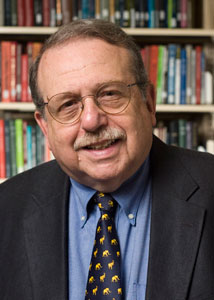  |
| HOME | THIS ISSUE | CALENDAR | GRANTS | BACK ISSUES | < BACK | NEXT > |
Oral history series offers readers
personal perspectives on diverse topics
|
||||
|
Oral historians, according to Bruce Stave, have recently become more conscious of the way memory changes. “Oral history is really remembering the past from the perspective of the present,” he says. “If someone is remembering back 50 years ago, it’s not like talking to them at the time that something happened. A lot intervenes. Memory colors why people forget.” Stave, a Board of Trustees Distinguished Professor Emeritus of History and director of the Center for Oral History, is co-editor of the Palgrave Studies in Oral History with Linda Shopes, a historian with the Pennsylvania Historical and Museum Commission. The series is published by Palgrave Macmillan. Two books in the series, Education As My Agenda: Gertrude Williams, Race, and the Baltimore Public Schools, by Jo Ann Robinson, and Remembering: Oral History Performance, edited by Della Pollock, have just been published. Five more books are due out in the next two months. The books are aimed at general readers as well as students and scholars. Oral history “humanizes history,” Stave says. “It allows you to hear it in someone’s own words – or at least, how they remember it.” Not all oral histories are composed the same way, he says. To Wear the Dust of War, one of the first in the series, is about Samuel Iwry, a Jewish immigrant who leaves Eastern Europe during the Holocaust and ends up in the Shanghai ghetto. Many Jews escaped to Shanghai, the only city in the world that took people in at that time. Iwry ultimately becomes a major scholar of Middle Eastern languages in the United States. “The author, Leslie J.H. Kelley, simply edits his words,” says Stave. Another earlier book, Sticking to the Union: An Oral History of the Life and Times of Julia Ruuttila, is “one woman’s story – a labor radical,” says Stave. In this case, the author, Sandy Polishuk, told the story. Education As My Agenda tells the story of Gertrude Williams’ efforts for educational reform in Baltimore during the latter half of the 20th century.
“I will always remember the closeness, the fighting, and the determination on the part of the … staff, parents, and so many people in the community,” Williams tells author/editor Jo Ann Robinson. “It was amazing how the people just pulled together to make sure that these children got a chance.” Williams, an African American, was a teacher, counselor, and principal in the Baltimore public schools for almost 50 years. Remembering: Oral History Performance is a series of essays about the use of oral history in crafting live performances. Co-editor Shopes says, “people often think that you place a tape recorder in front of people who expound eloquently, and the meaning of what they say is self-evident. Not true. Authors in Remembering start with oral history and use it for the basis of intellectually sophisticated work.” The next books due out are Creating Choice: A Community Responds to the Need for Abortion and Birth Control, 1961-1973, by David P. Cline; Postmemories of Terror: A New Generation Copes with the Legacy of the ‘Dirty War,’ by Susana Kaiser; Growing Up in the People’s Republic: Conversations between Two Daughters of China’s Revolution, by Ye Weili and Ma Xiadong; Voices From This Long Brown Land: Oral Recollection of Owens Valley Lives and Manzanar Pasts, by Jane Wehrey; and Life and Death in the Delta: African American Narratives of Violence, Resilience, and Social Change, by Kim Lacy Rogers. Stave is past editor of the Oral History Review and was president of the New England Association of Oral History. The Association awarded him the first Harvey Kantor Award for outstanding work in oral history. |
| ADVANCE HOME UCONN HOME |

